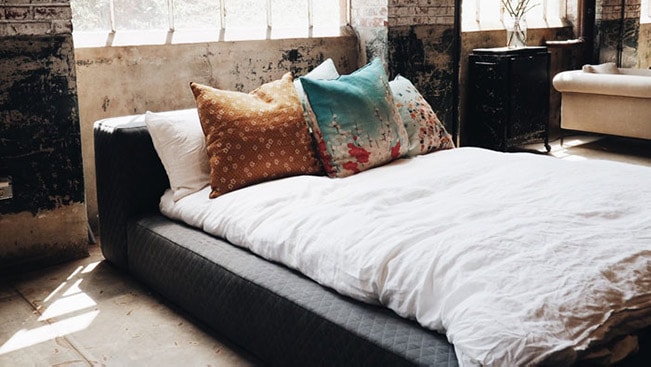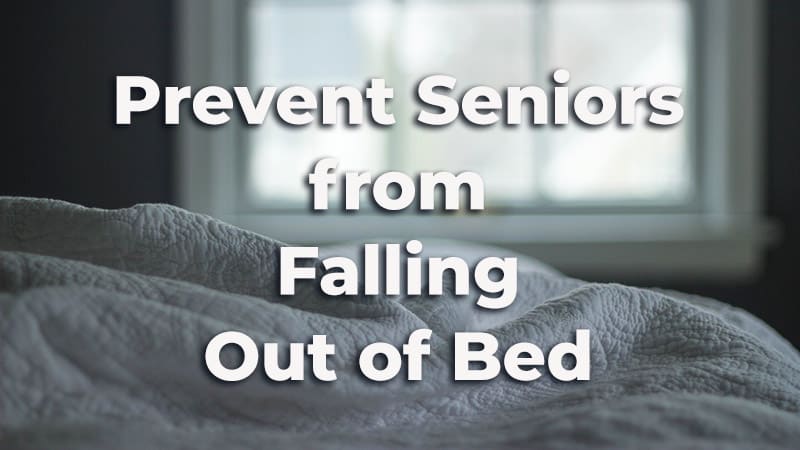Most people would agree that falling out of bed is not a pleasant experience, to say the least. Not to mention that it might lead to all kinds of injuries that you want to avoid at all costs, especially when it comes to seniors.
According to the CDC, 3 million older adults need emergency care due to falls each and every year. Unfortunately, rolling or falling out of bed is quite common among elderly people. This kind of fall often leads to severe injuries and it’s particularly dangerous when it happens frequently.
Seniors are much more vulnerable to falls than younger adults, so in their case prevention is especially important.
In this article, I’ll show you all the best and proven methods and interventions that will stop your elderly loved one from rolling off and falling out of bed. Fortunately, most of these methods are easy to implement and don’t require much time or effort.
Briefly, here are some ways to prevent an elderly adult from falling out of bed:
Using pool noodles, bedside wedges or body pillows is an effective way to prevent seniors from rolling off the bed. A special mattress or mattress cover with a raised perimeter can also help. Small, non-restrictive bed rails are highly effective to prevent falls out of bed and can also provide additional support for seniors when getting out of bed. Regular vision checks and reviewing medications are also important.
And now, without further ado, let’s see the details:
Keep in mind that when it comes to fall prevention, improving your loved one’s health can significantly contribute to success.
How to Prevent Seniors From Falling Out of Bed While Sleeping
1. Pool Noodles: a Subtle Way to Prevent Rolling Off the Bed

You might never have thought of using pool noodles to protect seniors from falls. The truth is, in many cases, simple pool noodles can help seniors stay on the bed during sleeping because they can serve as bumpers on both sides of the bed.
How to use them?
It’s very simple: all you need to do is place one pool noodle inside each side of the mattress pad or under the sheet. So you will need two pool noodles altogether. You can also use duct tape to connect them together.
Pool noodles serve as small and subtle barriers that indicate the edges of the bed and can prevent rolling off while sleeping. When used properly, they can be an affordable and effective way to protect your elderly loved ones.
What type of pool noodle should you use?
Well, I recommend you use long or extra long pool noodles (also called jumbo size) that have a diameter of at least 3.5 inches. Short and thin pool noodles are not suitable for use as bed bolsters.
These jumbo pool noodles are the right size:
If you’re more of a visual type of person, here’s a brief video that shows you how to use pool noodles to prevent falls out of bed:
2. Bed Rails: Effective Way to Avoid Falls
One of the most effective interventions to prevent seniors from falling out of the bed is installing bed rails on both sides of the bed (obviously, if the bed is next to the wall or your loved one doesn’t sleep alone you’ll only need one rail).
Bed rails don’t have to be restrictive, big, or ugly. Actually, in most cases, the smaller, compact ones are a better choice when it comes to fall prevention.
You can choose from permanent and detachable models. The latter ones are more popular as they’re very easy to both install and remove.
A sturdy and small U-shaped bed rail can be a great choice for those who don’t want anything obtrusive. It can be installed easily by sliding it between the box spring and the mattress without using any tools.
A U-shaped bed rail can highly decrease the risk of a fall, however, if you need more complete protection, you should have a look at extendable bed rails.
Here is a great example:
Rails not only prevent seniors from falling out of the bed but also help them get out of it easier because they can serve as a handrail that seniors can use to pull themselves up. When buying, always check the weight limit and opt for an adjustable model.
FYI – Bed rails can be really effective, however, they always should be used with caution in the case of elderly people with dementia or physical limitations to avoid entrapment. If you want to use rails in the case of elderly adults who are at high risk for entrapment, I suggest you also have a look at FDA recommendations.
3. Switch to a Mattress with Raised Perimeter
While it’s true that switching to a mattress with raised side bolsters is not the cheapest option, it can provide a definitive solution in many cases.
Concave mattresses with built-in raised edges can significantly reduce the chance of falling out of bed while sleeping.
However, at the same time they often make it somewhat harder to get out of the bed (especially those models without a center egress), so always consider your elderly loved one’s actual health status before buying one.
4. Special Mattress Cover: a Cost-Efficient Solution to Prevent Falls
If you want something similar to a concave mattress but don’t have the budget, you can opt for a safety mattress cover.
For instance, this model from Drive Medical with a defined perimeter is a reliable choice for most standard beds. It’s easy to install and clean and features bolsters to improve safety and stop seniors from falling out of the bed.
This is a popular model:
Using a special mattress cover is really a great solution if you want something more robust than pool noodles but cheaper than a concave mattress. It can also be a great alternative to bed rails. A mattress cover can be a more affordable solution than buying a new mattress and has pretty much the same efficacy.
5. Bedside Wedges
Bedside wedges, also called soft rails, are another great alternative to bed rails. They are usually made of foam and come in different sizes so you can choose the most appropriate model for your elderly loved one.
Bedside wedges are easy to use: usually, you have to fasten two sets to the mattress that will protect both the upper body and the legs from rolling off the edge. This way you can effectively prevent sudden night falls from the bed.
6. Reduce the Impact of a Fall Using a Bedside Safety Mat
Although this measure does not prevent nighttime falls from bed, it does indeed significantly reduce the severity of potential injuries (including head trauma).
You can place a specially designed safety mat or a foam mattress next to the bed to reduce the impact when a fall happens. Keep in mind that thick mattresses can be a tripping hazard.
Again: this solution doesn’t reduce the frequency of falls but can prevent injuries and their negative consequences.
7. Body Pillows: Quick and Cheap Solution to Keep Seniors In Bed

One of the most budget-friendly solutions is placing one or two thick body pillows on the sides of the bed. Sometimes they can do the job pretty well, so it’s worth trying. I know many elderly patients who successfully applied this simple method to prevent roll-off.
However, if falls are frequent, I recommend that you opt for a solution that includes fixed barriers (such as bedside wedges or extendable bed rails) instead.
If you want to know how you can make the whole bedroom much safer for seniors, don’t forget to check our all-in-one guide on bedroom safety.
How to Prevent Seniors from Falling While Getting Out of Bed
8. Use a Bed with the Right Height

The appropriate height of the bed is your elderly loved one’s knee level. Getting off a high bed can easily result in a sudden fall because of losing balance.
On the other hand, rising from a bed that is too low can be exhausting for seniors with weak muscles. Bottom line: make sure the bed is neither too high nor too low.
9. Review Medication to Stop Nighttime Falls
Studies show that certain types of medication like hypnotics, sedatives, benzodiazepines, and antidepressants can contribute to nighttime falls. Some drugs can cause balance issues, disorientation, or even confusion that can lead to accidents and injuries.
Regularly review your elderly loved one’s medication with a health professional, especially if falls happen frequently.
10. Get Your Loved One’s Vision Checked Regularly
Visual impairments, like cataracts and glaucoma, affect many seniors and can significantly increase the risk of falling. It’s especially true at night when there’s not enough light and it’s hard to notice obstacles around the bed. It’s good practice to get vision checked at least once a year.
11. Improve Balance and Mobility Issues
Sometimes seniors need something from the nightstand and while trying to reach it, all of a sudden they lose their balance. Older adults who suffer from poor balance and mobility difficulties are more prone to falling from the bed. As a preventive measure make sure your loved one has all the things she or he might need at night within reach.
Doing some fall prevention exercises regularly can significantly improve muscle strength, mobility, and balance in the long term. Learn more about fall prevention here (simple and effective tips).
12. Remove Obstacles Around the Bed and Install Proper Night Lights
You want to have a clean, clutter-free area around your elderly loved one’s bed. Seniors often wake up at night and visit the toilet. During these nighttime visits, they’re still sleepy and try to get to the bathroom without proper alertness. If they use a walker, make sure they do it properly.
The absence of bright enough night lights and unnecessary stuff around the bed can promote accidents. Falls often can be prevented just by installing night lights and removing obstacles. Consult a healthcare professional about the benefits of using a walker or a rollator.
13. Manage Cognitive Impairment
According to statistics, seniors with some type of cognitive impairment, especially those who suffer from Alzheimer’s dementia, are at a much higher risk of falling regardless of the time of the day.
If your loved one suffers from dementia, you want to be extremely thorough when it comes to fall prevention. Depending on the severity of the disease you may want to take multiple precautions at the same time to prevent falling from the bed.
Sometimes seniors suddenly start falling out of bed. In some of those cases, the reason is some kind of health issue including a deteriorating mental state.
Dementia is not reversible but its progression can be slowed down. However, for this purpose, you’ll need to regularly visit a psychiatrist with your loved one to evaluate the current condition and suggest proper therapy.
14. Join a Fall Prevention Program
Fall prevention programs for seniors are getting more and more popular and for a good reason: they’re proven to effectively reduce the number of falls.
According to statistics, 33 percent of adults age 65 and over fall each year. If an elderly adult falls once, it doubles the chance of falling again. Therefore, prevention is extremely important.
Fall prevention programs help seniors improve their balance, muscle strength, and overall fitness through special exercises. They also help them cope with everyday challenges and overcome their fear of falling by following proven fall prevention strategies.
So joining a fall prevention program is highly recommended as it can really improve quality of life. Here you can find programs in your area.
Conclusion
As you can see, protecting seniors from falling out of bed is an achievable goal. As always, the best approach is to consider the possible causes of the falls, your loved ones’ needs, and condition, and make changes accordingly.
Always talk to your loved ones about the precautions you’re planning to take. Ask about their suggestions and respect their opinion.
Keep in mind that elderly people with dementia need much more care and attention and you should regularly consult with a professional as well. By applying the right interventions, you can definitely keep seniors from falling out of bed, protect them from injuries, and avoid hospitalizations.
Photos: Wikimedia (ashleigh 290, Malinaccier)















